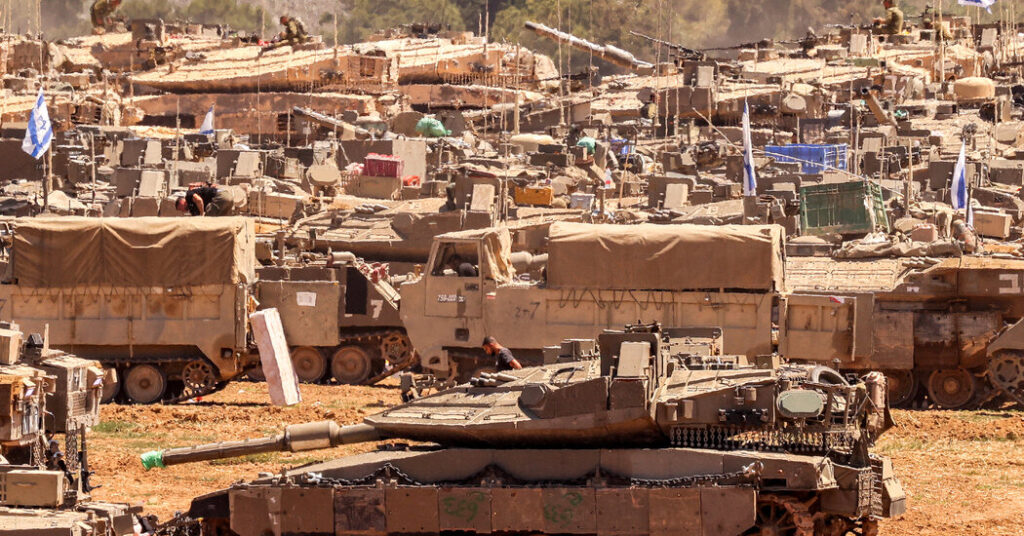Israel has played down the U.S. decision to refuse to deliver some 2,000-pound and 500-pound bombs, insisting that deep ties will outlast tensions. But analysts said the pause, and the timing of the White House confirmation on Tuesday, showed that U.S.-Israeli relations have broken down in new ways and that more breakdowns are likely to come.
“This is Biden’s pent-up frustration finally coming to the fore,” Chuck Frelich, Israel’s former deputy national security adviser, said on Wednesday. “The administration has been walking a tightrope between strong support for Israel and domestic pressure. ”
This week in particular, two opposing elements of President Biden’s military support for Israel are converging and vying for global attention.
President Biden showed he remains deeply committed to Israel by approving new U.S. aid involving $827 million worth of weapons and equipment and delivering a tough speech against anti-Semitism at a Holocaust commemoration ceremony.
At the same time, he said U.S. aid and patience were limited and was suspending shipments of the heaviest munitions — 1,800 2,000-pound bombs and 1,700 500-pound bombs — over concerns about their use in a possible full-scale attack.
This week, the Israeli military warned some 110,000 civilians to flee eastern Rafah as its tanks moved in and occupied the Gaza side of the city’s border with Egypt. The move fell far short of a full-scale invasion, but half a day later the White House confirmed it had suspended bomb deliveries while suggesting it might be imminent.
Israeli officials mostly promote the former and ignore the latter.
At a conference hosted by a local newspaper on Tuesday night, the military’s chief spokesman, Maj. Gen. Daniel Hagari, said coordination between Israel and the United States had reached “unprecedented scope” while insisting that any disagreements would be “handled privately.” .
He sidestepped questions about U.S. dissatisfaction and potential risks to future arms shipments, stressing the importance of day-to-day coordination and “operational assistance.”
Online, some supporters of stronger attacks on Rafah Hamas insist the United States has no right to seize weapons to influence how Israel fights. But for now, such delays are unlikely to seriously hamper Israel’s war effort, according to military analysts.
Israel has a vast arsenal at its disposal and a number of options for operations in Gaza, which do not necessarily include bombs that Washington has not yet sent.
Former Israeli diplomat Alon Pincus said the U.S. decision was prompted by rising U.S. dissatisfaction with Israeli Prime Minister Benjamin Netanyahu and calls from some congressional Democrats for closer oversight of Israel’s use of Pressure on American weapons. He added that this was an attempt to warn Israel that more consequences might be coming.
“The logic behind this is a warning: If you don’t get your act together, more obstacles may arise,” Mr. Pincus said.
If nothing else, the decision highlights Israel’s Dependence on U.S. ammunition.
He called them “our bread and butter in the present war and the battles to come.”
He added that even the loss of continued access to some U.S. weapons would be “very serious.” He blamed the government for its repeated rejection of U.S. demands, including calls for greater protection of civilians and prioritizing a plan to govern Gaza after the fighting ceased.
“Given the way the prime minister and some ministers have antagonized Biden and the United States,” he said, “it’s not surprising that something like this is happening.”
Mr. Freilich, a frequent critic of the government, also called the arms pause significant. He believes that Israel’s actions in Gaza have become more precise in recent months.
But he said Biden’s control of thousands of large bombs was a reminder to Israeli officials that even staunch supporters can only take so much. Freilich said that while the limited U.S. operations currently underway in Rafah may not pose major problems, the timing of identifying the weapons appears to be targeted at two specific audiences.
“They are sending a message to Bibi: continue and not expand operations in Rafah,” Mr. Freilich said. “They are sending a message to American voters that we are doing something.”
Aaron Boxerman Contributed reporting.

